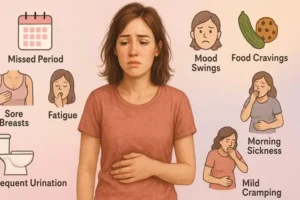Every pregnancy is unique, just like every mother. While some women experience strong pregnancy symptoms, others may hardly feel a thing. This can lead to confusion and anxiety. Understanding the signs of a healthy pregnancy can help you feel more confident and reassured throughout your journey. Remember, having fewer symptoms doesn’t mean anything is wrong. As someone who has supported hundreds of expecting mothers, I can assure you: there are many ways to know your pregnancy is progressing well.
Table of Contents
ToggleWhat Does a Healthy Pregnancy Feel Like?
A healthy pregnancy can feel different for each woman. Common sensations include tender breasts, mild cramping (similar to period pain), increased tiredness, emotional ups and downs, and frequent urination. Some women also feel a “fullness” in the lower belly. However, it’s also normal to feel very little in the early weeks
Signs of a Healthy Pregnancy Early On (First 4–6 Weeks)
The first few weeks are often when the most subtle signs appear. These include:
These are early signs of a healthy pregnancy. Your body is adjusting to rising hormone levels, especially hCG and progesterone. Not all women experience strong symptoms, so do not worry if your signs are mild or inconsistent.
Physical Signs of a Healthy Pregnancy Physical signs vary from person to person. Some of the most common physical signs include:
Growth in breast size and tenderness
Clear or milky white vaginal discharge (leucorrhoea)
Mild cramping without bleeding
Gradual weight gain and increased appetite
Discharge during the first trimester is completely normal. A healthy pregnancy discharge is usually thin, white, and odorless. However, if you notice a foul smell, green/yellow color, or itching, consult your doctor Now.
Signs of a Healthy Pregnancy Week by Week (Trimester Breakdown)
First Trimester (Weeks 1–13):
High hCG levels confirmed in blood tests
Light spotting or implantation bleeding (normal in early weeks)
Fetal heartbeat detectable around 6–8 weeks
Second Trimester (Weeks 14–26):
Noticeable baby bump and weight gain
Reduced nausea and more energy
Fetal movement around 18–20 weeks
Normal blood pressure and urine results
Third Trimester (Weeks 27–40):
Strong and regular baby movements
Steady weight gain and uterine growth
Preparation for labor (Braxton Hicks contractions)
Signs of a Healthy Pregnancy Without Ultrasound
In some cases, especially in rural areas or early pregnancy, an ultrasound might not be available. In such situations, signs of a healthy pregnancy without ultrasound include:
No heavy bleeding or pain
Positive pregnancy tests (home and blood-based)
Steady increase in weight or abdominal size over time
Traditional signs used by Indian women include glowing skin, increased appetite, or even slight pigmentation changes.
Can You Have a Healthy Pregnancy with No Symptoms?
Yes, absolutely. Some women don’t experience common pregnancy symptoms. This is called a “silent pregnancy,” and it’s more common than you think. As long as there is no bleeding, cramping, or unusual discharge, and regular prenatal check-ups are normal, you can still have a healthy pregnancy.
When to Worry About No Pregnancy Symptoms Lack of symptoms is usually not a concern. However, you should contact your doctor if:
You had symptoms that suddenly stopped (especially in the first trimester)
You experience heavy bleeding or painful cramps
There is foul-smelling or colored vaginal discharge
Signs of a Healthy Pregnancy After Miscarriage
After a previous miscarriage, it’s natural to feel worried. Signs of a healthy pregnancy this time may include:
Normal blood hormone levels (checked via hCG tests)
Strong fetal heartbeat in early ultrasound
No spotting or minimal implantation bleeding
Gradual physical changes like breast tenderness and fatigue
Talk to your doctor about regular monitoring and early scans for peace of mind.
Expert Tip: Monitoring Your Pregnancy Without Stress
You can keep a simple pregnancy log with the following:
- Daily symptoms
- Weekly weight and belly measurements
- Fetal movements (from week 18 onward)
Also, follow Indian pregnancy tips like:
- Eating iron-rich foods (palak, jaggery, beetroot)
- Drinking coconut water and milk
- Practicing light yoga and walking
- Helpful apps for Indian moms include: myUpchar, Maatritva, and Pregnancy+.
When to Consult Your Doctor
- Severe or sharp abdominal pain
- Heavy bleeding
- High fever or chills
- Foul vaginal discharge
- No fetal movement after week 24
Always keep your antenatal file ready and stay connected with your doctor.
Final Thought
Pregnancy looks different for every woman. Whether you have all the symptoms or none, what matters most is how your body and baby are progressing. Regular check-ups, self-care, and staying informed will help you experience a healthy and joyful pregnancy.
Useful Resources
Internal Links to Add:
Yes. Not every woman experiences morning sickness. It doesn’t mean something is wrong.
Yes. As long as it’s not smelly or colored, it’s a common and healthy sign.
Gradual growth of the baby, hormonal changes, and new physical signs appear week by week.
No. Some women never have breast tenderness and still have healthy pregnancies.
Between weeks 6–8, to confirm the heartbeat and estimated due date.



